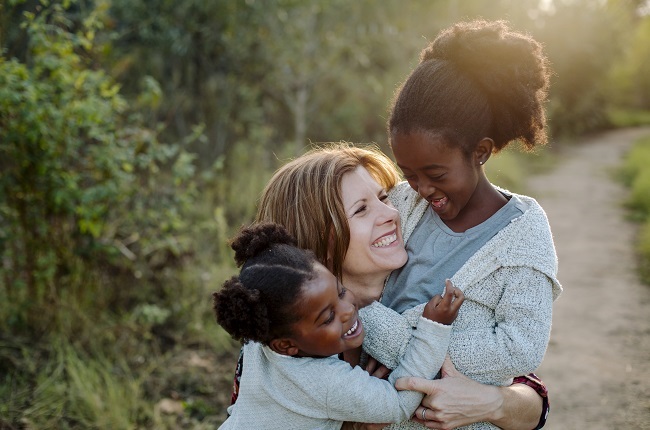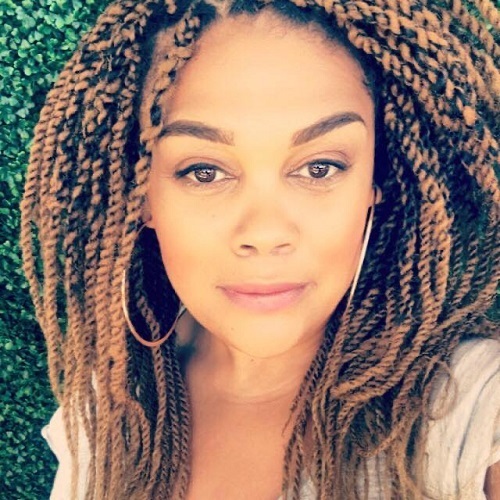
Adult adoptee Sara-Jayne Makwala King was 27 years old and two years sober when she came undone at a life-affirming lecture presented by UK-based psychotherapist Paul Sunderland.
The lecture, now publicly available on YouTube, was about how adoption and addiction intersect. In summary, the lecture explains how the moment of relinquishment – being separated from one's birth mother – is a primal wound for any adoptee that will always be recalled, even if it isn't remembered.
"I had attended the lecture with a few addiction professionals and a handful of other adoptees, and I ended up bawling. Everything that he said resonated with me in a way that nobody had ever spoken about to me before," Makwala King tells News24.
Sunderland's lecture was a seminal moment of clarity for the CapeTalk host and author.
Then a young adult who had wrestled with some ugly demons, Makwala King had been deeply moved because, for the first time in her life, she understood why she felt the way she did, and how her addiction and mental health struggles were firmly rooted in her relinquishment – the moment she separated from her birth mother at just seven weeks.
Read: How do we humanise a dehumanising system? Adoption NPO on advocating for family preservation
Language is important
The world was adept at telling Makwala King to be grateful, yet she lived most of her life in pain that she couldn't quite pinpoint, until the day of Sunderland's lecture. He empowered her with much of the language she now uses to talk about adoption and her experience as an adoptee.
"The only thing I'd ever been told about my adoption was, 'Aren't you lucky? Your biological mother didn't want you, but aren't you lucky that your adoptive parents did?' Growing up, nobody had ever sat me down and asked me how I felt about something. They had never given me the language for the trauma I was experiencing," says the adoptee advocate.
'You can't love the trauma out of your child'
Makwala King's story of relinquishment forms the basis of her first memoir Killing Karoline, which tells a story so unbelievable that it reads like fiction.
Born in 1980 in apartheid South Africa, Makwala King was the result of an illegal affair between a white British woman and a black South African man. As a result, she was flown to England and adopted by a white couple who raised her as their own.
But this was by no means the happy ending that the traditional adoption narrative might impose on her story.
"I was seven weeks old when I was given up by my mother. And people get cross when I use those words, but it's true. She flew to England, put me in the hands of strangers, and got on a plane back to South Africa. You can put as much flowery language on it as you'd like, but the fact is, she gave me up. And I don't know her today, so it is what it is," she says.
Makwala King doesn't remember the moment that she parted from her birth mother, but she recalls:
"It's a trauma like any trauma. It's stored in my limbic system," she adds, backing Sunderland's assertion that we need to start calling adoption by what it is, and rather refer to relinquishment. Makwala King also acknowledges that most adoptees are adopted by loving people. But she reiterates that the heart and intention of adoptive parents is not what's at issue here.
"Something awful happens to adoptees before they are adopted by their loving parents. So it's not about whether you're adopted by loving people, and it's not about intention or how much they love their child. It's about trauma, and you cannot love the trauma out of your child. That's not how trauma works. No amount of love, or holidays to Disneyland, will get rid of it."
'What you're describing wasn't my experience'
With that said, Makwala King views trauma as an unavoidable fact of life, adding that, in terms of adoption, each adoptee's story will invariably begin with trauma.
"But trauma is not necessarily an 'ugly' thing. It's a part of life. I don't think I know anyone who hasn't experienced some trauma in their life," she asserts.
What should be avoided, however, is the perspective of adoption as a positive "win-win" scenario without the acknowledgement and processing of the adoptee's trauma.
"This is a narrative that has been perpetuated for far too long, and one that ultimately harms adoptees. This is why there is a growing movement of people like myself, adult adoptees, who are sticking our heads above the parapet and saying, 'Hold on a minute, what you're describing isn't our experience at all'."
Makwala King acknowledges that the growing number of adult adoptees who are speaking up about their experience is often perceived as adversarial, especially to adoptive parents.
"But that's not what it should be at all," says the advocate.
"There simply needs to be a recentring and a refocusing of how we view adoption. We need to start seeing it from the perspective of the people who are most impacted," she says.
Also read: 'After 20 years, I found my biological family' – adult adoptee shares how she came full circle
'Adoption is about the children'
Adoptive parents, or prospective adoptive parents, need to play a seminal role in changing this narrative by putting in a significant amount of work – including research and introspection – before embarking on the adoption process.
This might include considering your reasons for adopting and challenging any core beliefs that might position you as a "selfless" or a saviour.
"Adoptive parents are part of a system that has supported this way of thinking. The entire world tells adoptive parents what an amazing thing they're doing. But this isn't what adoption is supposed to be about. Adoption is not supposed to be about parents, it's supposed to be about children," says Makwala King.
She adds that, if adoption was truly about the children, there'd be far fewer taking place.
"If people were genuinely invested in the children, they'd read and research the evidence that suggests children are better off in their families of origin."
Makwala King also believes that adoptive and prospective adoptive parents need to challenge the system itself, and recognise it as problematic.
She notes, for instance, that a fraction of adoptable or fostered children would be in that position if sufficient resources were repurposed and invested in family preservation.
"Very few children really need to be adopted. There are so many alternatives and, at the end of the day, adoption should be the last resort. Adoption is not a solution to poverty, and it's not a solution to drug-addicted parents."
Must read: Deromanticising the adoptive parent narrative: Anecdotes that changed the way I think about adoption
'Even orphans have a past'
It's for all these reasons (and more) that Makwala King, even as an adoptee, would never consider adoption.
"Why would I adopt!? It's traumatic and it's completely unnecessary. If I wanted to support a child, there are a number of different ways I could do that. If they needed me to, I could be their legal guardian, or I could contribute financially to their family," she says.
"And, in the case of orphaned children, the idea that you are trying to take a child and make that child your own is problematic to me, because even orphans have a past. These children are not borne unto you."
Makwala King adds that, more often than not, even orphans who have lost both their parents have a widespread extended family who should be able to care for them.
"There is just no need for me to adopt," she says, though she acknowledges that other adoptees might feel differently to her about the issue. Adoptees are the experts.
While she may not agree with it, Makwala King is under no illusion that adoption will ever cease to exist.
She reiterates, however, that her campaign is not against adoption, but against the way it is traditionally framed and spoken about.
"If you're really interested in making adoption adoptee-centred, adoptee-focused, listen to us, we are experts in this. You can go to as many experts, psychologists, sociologists, social workers and whoever else to talk about it, but we are the experts. Listen to us."
Makwala King's story continues in her second memoir, Mad Bad Love. Among other twists and turns in her incredible life story, the author unpacks what it was like to become a mother as an adoptee.
Chatback:
Share your stories and questions with us via email at chatback@parent24.com. Anonymous contributions are welcome.
Don't miss a story!
For a weekly wrap of our latest parenting news and advice sign up to our free Friday Parent24 newsletter.




 Publications
Publications
 Partners
Partners












